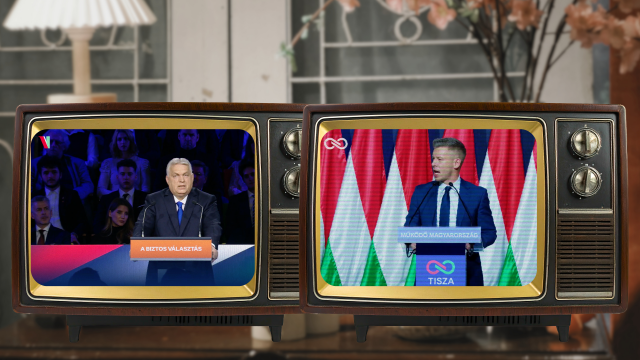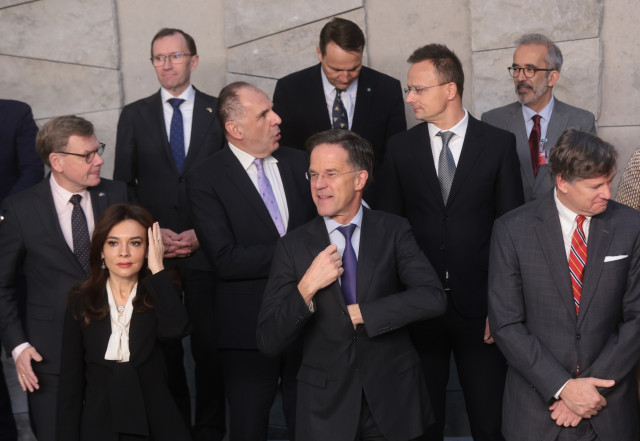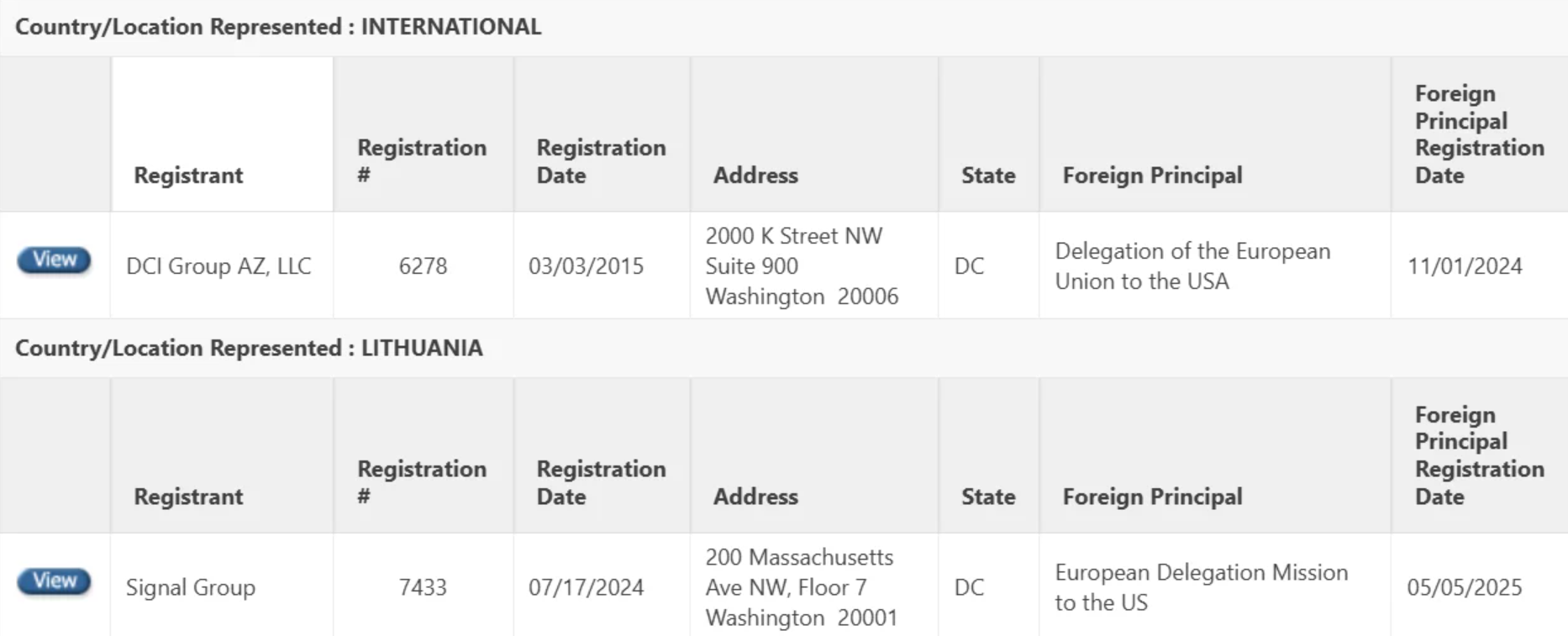Hungary’s sovereignty chief referred to the American FARA, but the government’s proposed foreign agent law follows a very different logic
2025. május 27. 15:21
Ezt a cikket 2025
májusában írtuk.
A benne lévő
információk azóta elavulhattak.
Before Tamás Lánczi, the governments of Kyrgyzstan, Georgia and Russia tried to justify their own foreign agent laws by using the American example. With no good reason. The US FARA law does not threaten independent NGOs and media with closure, but it does require Russian and Chinese state media to register.
Authors: Fanni Barczikai – Zsófia Fülöp – Máté Pálos
On 13 May, just before midnight, János Halász submitted a bill entitled “On the Transparency of Public Life”, which allows the Sovereignty Protection Office (SPO) to draw up a list of organisations that it considers to be a threat to Hungary’s sovereignty. Inclusion on the list will lead to automatic sanctions. The proposal was debated in Parliament on Tuesday 20 May and is expected to be voted on in June.
The draft law provides that the organisations included on the list drawn up by the government based on a proposal from the SPO:
- will not be eligible for the 1 percent of the VAT donation;
- their leaders must declare their assets as prominent public figures;
- shall accept foreign grants only with the permission of the anti-money laundering body, the National Tax and Customs Authority;
- banks must monitor their accounts continuously, if foreign aid is detected they can suspend the transaction and the Tax Authority can even order the organisations to repay the money;
- their domestic donors must also declare that the aid is not indirectly received from a foreign source.
Exactly which countries “abroad” will mean in practice is not yet known. The only example given in the preamble of the previous law on the protection of national sovereignty was the United States of America, and in the reports of the SPO so far, the United States (e.g. the USAID programme) and the European Union (e.g. the CERV, i.e. the Citizens, Equality, Rights and Values projects) are listed as foreign funders.
Several NGOs and editorial offices, including Lakmusz, have expressed their views on the bill in a joint statement , saying that it “aims to silence all critical voices and to eliminate what remains of Hungarian democracy.”
Tamás Lánczi, president of the SPO, told national radio on 15 May, a day after the draft law was submitted, that the Hungarian legislation could be compared to the US Foreign Agents Act and is actually less strict. “There, too, you have to register organisations with which, and even at home, you have to register them, (…) which are financed from abroad and then controlled by a foreign power,” Lánczi said. According to the president, the Hungarian law is in many respects more sophisticated and lenient than US law: for example, the US law has a stigmatising character because it labels all foreign-funded press as foreign agents. Earlier, the official also told a 444 journalist that:
“You would be registered as foreign agent in the US.”
The government and the government-controlled media have also referred to the US Foreign Agents Registration Act (FARA) when creating the SPO, alongside some other Western examples such as the new French Anti-Foreign Influence Act and the EU’s efforts to combat foreign influence . Viktor Orbán himself referred to FARA as a model for Hungarian legislation at the time of the 2017 Civil Liberties Act, which has since been repealed following a European Court of Justice ruling.
These references are misleading. Why? Because:
- The 2024 French law mainly protects French democracy against influence attempts by Russia, China, Iran and Turkey, with the text of the law specifically stating that EU member states cannot be included in the foreign category.
- According to the EU proposal , there must be a link between foreign funding and lobbying activities: “lobbying activities carried out on behalf of third countries” are only considered as events to be registered if they aim to influence EU public life and democratic processes.
- FARA, created in 1938, differs from the Hungarian bill in all its essential details: it is voluntary, it does not automatically sanction, and in the case of non-registration, the state must prove “foreign agent” status. Operating with foreign funds is not in itself considered to be foreign influence, and the law does not threaten independent NGOs and media with impossibility of operation. It is no coincidence that only Russian and Chinese state channels have been included on the list of media in recent years.
- Unlike in the US, the Hungarian draft law lacks the component of defining the relationship between trustee and principal: it does not state that the condition for being listed is foreign control. Even when describing the Tax Authority’s procedure, it includes only a non-exhaustive list of what is considered influence: for example, the fulfilment of the foreign sponsor’s requests or the furtherance of its objectives.
Moreover, as Miklós Ligeti, Legal Director of Transparency International (TI) Hungary, told Lakmusz, the regulations of a given country cannot simply be arbitrarily taken out of their political and legal context and transposed into the legal environment of another country. Ligeti said:
“The US Foreign Agents Act in no way legitimises Hungarian law. Hungarian law must be examined in the Hungarian context. If a legislator is doing his job honestly, he would never think of legitimising his own regulation by referring to foreign laws”.
While FARA mainly applies to lobbyists working on behalf of foreign governments and aims at transparency, the Hungarian law allows the SPO to stigmatise and list organisations and threatens them with immediate sanctions.
However, the Hungarian state is not the only one trying to justify its own law on agents by using the false US example: Russia, Kyrgyzstan and Georgia have done so in the past.
What is FARA about and why is it so different from the Hungarian bill?
The FARA law on the registration of foreign agents (lobbyists, representatives) was passed in the United States almost 90 years ago, in 1938. Its purpose was to map the propaganda of Hitler’s Germany, but it was also used against communist infiltration during the Cold War. The law requires persons or organisations who engage in foreign-sourced political or public-affairs activities in the United States to register in the FARA database and to report regularly on their activities and sources of income.
In the first FARA trial , three Soviet propagandists were convicted, and during the war many more were tried – not for their foreign sources per se, but for failure to register.
In 1966, the applicability of the law was significantly narrowed: from then on
organisations or persons had to register only if they were acting at the direction, request or control of a foreign principal, or was wholly or mainly financed by the foreign principal, and its activities could be shown to be in the principal’s interest.
In 1999, the term “propaganda activities” was also removed from the text. (However, over the past few decades, FARA has been somewhat forgotten – a total of seven prosecutions under the Act had been brought by 2016.)
In contrast, in the Hungarian draft law , the only condition for listing is that the organisation “carries out activities aimed at influencing public life with foreign support”, which the SPO considers to be a threat to Hungary’s sovereignty. The proposal is silent on the required extent of foreign support and defines influencing public life very broadly: for example, according to János Halász, sovereignty is also threatened by the negative portrayal of the primacy of biological sexes or Hungary’s constitutional identity.
The Hungarian bill only provides more details on the relationship between the foreign donor and the supported organisation when regulating the Tax Authority’s procedure. The Authority may order the return of foreign aid if it finds that the aid is intended to influence public life, “in particular by serving to comply with the foreign donor’s requests or to further its aims”. Here too, the phrases ‘in particular’ and ‘to further its aims’ allow for an unlimitedly broad interpretation.
Interest in US FARA has intensified since the 2016 US presidential election , when suspicions of Russian and Chinese influence were raised. The US government, including the Department of Justice, required the US offices of two Russian state-owned media companies, Russia Today (RT) and Sputnik , and several Chinese state news agencies, including CGTN and Xinhua , to register.
These media outlets have been required to register under the logic of FARA because they are state-funded, operate under the kind of state control that does not give the editorial staff any room for manoeuvre and consequently no possibility to report objectively. Thus, they represent the interests of the state, implementing its instructions in the United States. Even so, there are no restrictions on activity, registration is a matter of filling in a form of a few pages – the aim is to make the state-owned nature of these outlets public.
It is interesting to note that between 2014 and 2018, the FARA list also included a US lobbying firm (SLI Group LLC) linked to Századvég, which worked on behalf of the Hungarian government, more specifically the Prime Minister’s Office, in Washington.
There are no independent media publishers on the FARA list
In addition to the Russian and Chinese examples, media outlets, news providers and newsrooms are not included in the registration database because section 611(d) of the Act , which clarifies definitions, specifically states that no journalist, media worker or news provider may be an agent of a foreign principal,
- if the media company is legally incorporated in the United States,
- it is at least 80 percent owned by US citizens and its managers are US citizens,
- and is not directed, financed, or controlled by a foreign government, political party, or entity operating under the laws of another country, nor are its operations and editorial practices governed by such laws.
Most of the actors in the FARA database are lobbying or legal representation firms that work on behalf of foreign governments or state-owned enterprises in the United States. International NGOs or foundations of any kind are rare: for example, we found on the list a foundation working to promote the value of pluralism but funded directly by the Canadian government – the foundation’s stated purpose is to persuade policymakers of the values it represents.
The law exempts from registration organisations, NGOs, which, while carrying out activities that can be broadly defined as political, do not predominantly serve foreign interests, i.e. do not demonstrably work to promote the interests of a particular client – even if their funding comes from abroad. This is why even Russian-funded NGOs operating in the US have not previously been subject to FARA registration.
Of the currently active registrants, a total of 6 are listed under the category of “international”, i.e. non-national clients: for example, the US office of the Caribbean Tourism Organization, the Arab Information Centre representing the League of Arab States, or lobbyists representing the US delegation to the European Union.
Source: efile.fara.gov
For Germany, for example, there are 11 active registrations, including Deutsche Telekom, various groups working for German industry, groups under the federal or state governments, and the German Tourist Office.
The FARA database also allows for keyword searches: the term “European Union” brings up a total of 11 hits , of which only three are related to the EU. These are all official EU delegations that are engaged in political activities in the United States.
Some results for the search term “EU” in FARA’s registration database, which lists the official bodies of the EU. Source: efile.fara.gov
The official FARA website also lists cases where the authorities have detected failure to register – these cases also reveal a lot about US attitudes and the application of the law.
- For example, in 2024, in the bribery case of Senator Robert Menendez, he was found to have acted as an unregistered foreign agent when he tried to secure a monopoly for an Egyptian businessman in exchange for benefits through the US Department of Agriculture.
- In 2023, Gal Luft was indicted on numerous charges for working as an associate of a Maryland non-profit think tank, but in fact on behalf of and at the direction of China, to get certain pro-China measures passed among government officials and the public.
The criminal charges in those cases were broader than the mere violation of FARA.
Reverse logic
“One of the biggest differences between the Hungarian and the US regulations is that there are no sanctions for registering as a foreign agent in the US, and the organisations that are on the list are not banned from doing anything, they are not stigmatised. They are on a list that anyone can look at, just as in Hungary, for example, when signing a contract, we look at the information of the company in the company register. And that’s it,” Miklós Ligeti told Lakmusz.
He added that FARA penalises people who are obliged to register but do not do so. In such a case, the Federal Ministry of Justice will investigate and may initiate civil or criminal proceedings. From there, the case is taken to court. Failure to register is punishable by up to five years’ imprisonment and a fine.
“This also shows that FARA works on a completely different logic than the Hungarian draft law: in the latter, the state puts organisations on a list, and they cannot object, whereas in FARA the organisation may or may not put itself on the list. There is no defence. If the state does not agree, it has to enforce the regulations through the courts.”
– said Ligeti.
In other words, although it requires registration, the US Foreign Agents Act does not prohibit any activity, nor does it automatically sanction organisations. Sanctions for failure to register can be imposed, but only at the end of a court proceeding.
Under the Hungarian draft, however, listing that leads to sanctions in itself would be decided by the government by decree, based on a proposal from the SPO. The government decree cannot be challenged in court and can only be annulled by the Constitutional Court. The decision of the Tax Authority to withhold foreign funds can be appealed to the Supreme Court, however, the Supreme Court cannot change the decision of the Tax Authority but can only order it to start a new procedure.
Criticisms and concerns about FARA
As the implementation of FARA has intensified in recent years, so have the criticisms of the legislation, as highlighted in Transparency International’s report from 2024. Critics say that the law’s broad wording and flawed definitions open the door to political abuse. Although the US law is much more detailed than the proposed Hungarian one, it does not define precisely what a “foreign principal” is, what is meant by “instruction, request or direction”, and it is not clear what activities are covered by the law.
For this reason, rights groups, professional bodies and other advocates of reform have long called for a comprehensive review of FARA. They believe that the application of FARA has changed a lot in recent years and fear that in the future it will be used to interfere with the operations of non-profit organisations, businesses, the media, religious institutions and universities.
Moreover, they believe that FARA can be used as a reference
for authoritarian governments seeking to legitimize their own foreign agent laws for political repression.
In 2021, the American Bar Association Task Force published a comprehensive report on options for amending FARA, primarily to clarify the vague definition of “foreign principal” and to narrow the scope of FARA. In response to the criticisms, the Ministry of Justice has also announced plans for reform, but the outcome remains uncertain, and the law has remained essentially unchanged since 1995 .
Others also refer to FARA
Hungary is not the only country to claim that its law on foreign-funded organisations is modelled on the US. As we have written before , a common feature of the foreign agent laws adopted, submitted or proposed in the broader Central and Eastern European region is that, although the submitters claim that they are basedon the US model, their content bears more similarities to the Russian Foreign Agent Act.
1. Georgia
Georgia’s first Foreign Agents Act came into force in June 2024, when the Georgian Dream – Democratic Georgia party, in power since 2012, cited FARA as a model to follow. International lawyer Ted Jonas, who has been living in Georgia for decades, has written at length about how the two laws are not very similar. He found, among other things, that the US law does not automatically presume that a foreign-funded organisation is a foreign agent, while the Georgian law assumes that the mere fact that an organisation receives foreign funding is sufficient to be labelled a foreign agent.
In March this year, the Georgian government adopted a new foreign agent law , described as a translation of the FARA law. Tamar Kintsurashvili , director of the Georgian Media Development Foundation (MDF) and editor-in-chief of the fact-checking site Myth Detector , told Lakmusz in April that the purpose of this law is completely different from the American one.
“The latter applies to foreign lobbying organizations, it was created against ‘external enemies’ of the United States, not against local organizations and individuals who work for the country and not against it, as it is intended to apply in Georgia.”
2. Kyrgyzstan
According to the law adopted in Kyrgyzstan in April 2024, organisations that receive foreign funding and engage in “political activities” are considered foreign agents. The Kyrgyz leadership, in power since 2020, has good relations with Russia , and their foreign agent law is modelled on Russian law : according to an analysis by the International Centre for Not-for-Profit Law (ICNL), more than 90 percent of the Kyrgyz legislation is copied from the Russian foreign agent law. Despite this, Kyrgyz lawmakers have pointed to the US law as a model to follow.
3. Slovakia
In Slovakia, the far-right and pro-Russian Slovak National Party (SNS), currently part of the governing coalition, proposed last April to introduce a foreign agent law targeting mainly NGOs. According to the Slovak political leadership, their legislation would be modeled on the US model. However, Fedor Blaščák, director of the Open Society Foundation, told Slovakia’s EURACTIV:
“Ideologically, it is a Russian/Putin style proposal. They have a very similar starting point – they are directed against active citizens, civil society and democratic principles”.
The law was passed by the Slovak parliament in April this year under the fast-track procedure. The legislation was eventually relaxed compared to the draft: it requires NGOs to disclose information about their supporters – and those who fail to do so can be fined – but does not classify them as lobbying organisations.
4. Republika Srpska
During the preparation of the law, the President of Republika Srpska, the famously pro-Russian Milorad Dodik, said that the law was modelled on the US model . In a press conference, he noted,
“foreign-funded entities operating in the United States are called foreign agents under US law. Republika Srpska will use the same terminology, only we will write Republika Srpska instead of the United States.”
In response, the US Embassy in Bosnia issued a statement distancing itself from Dodik’s words, saying that the US model is in stark contrast to the approach Dodik outlined. According to a March 2023 analysis by Radio Free Europe Bosnia, the law proposed in the Republika Srpska bears extreme similarities to the Russian Foreign Agents Law.
At the end of February this year, the Republika Srpska parliament voted in favour of the law , but at the beginning of March, the Constitutional Court of Bosnia and Herzegovina suspended it , citing the need to examine whether the law was unconstitutional.
5. Serbia
In Serbia, the Socialist Movement party announced last May that it was preparing a bill to restrict the activities of NGOs that receive more than 50 percent of their funding from abroad. The bill was submitted to parliament in December last year, but since then there has been no news of its adoption.
Aleksandar Vulin, the party’s founder and former leader, also cited the US Foreign Agents Act as an example when it was introduced, saying, like the Kyrgyz leadership, that the whole foreign agent thing was invented by the US and even Russia took the idea from them.
+1. Russia
In Russia, the Foreign Agents Act was introduced in 2012, at the beginning of Vladimir Putin’s third presidential term. It requires NGOs receiving foreign funding to register as foreign agents, even if the foreign funding is not used for political activities. In December 2022, the definition of foreign agent was expanded: almost any NGO or individual can be classified as a foreign agent if the authorities claim that it is “under foreign influence”, “engaged in political activities”, collecting or disseminating information on Russia’s military activities or financing such activities.
Both Putin and the Russian leadership are fond of pointing to the fact that the US FARA law was used as a model when the Russian law was drafted, and that elements of the FARA were incorporated into the Russian legislation. However, several analyses have shown that the two laws are similar in name only and are not comparable in terms of legal framework or practical application.
Illustration: Fanni Barczikai
A szerzőről

Lakmusz
Kövess minket!
Ne maradj le egy anyagunkról sem, kövess minket máshol is!
Ajánlott cikkeink

Orbán több gyerekről és több munkahelyről beszélt, a Tisza visszavágott a sorkatonasággal – megnéztük, mi igaz az évértékelők állításaiból

Félrevezetően ollózták össze a NATO-főtitkár mondatait, hogy Szijjártó felháborodhasson rajtuk


